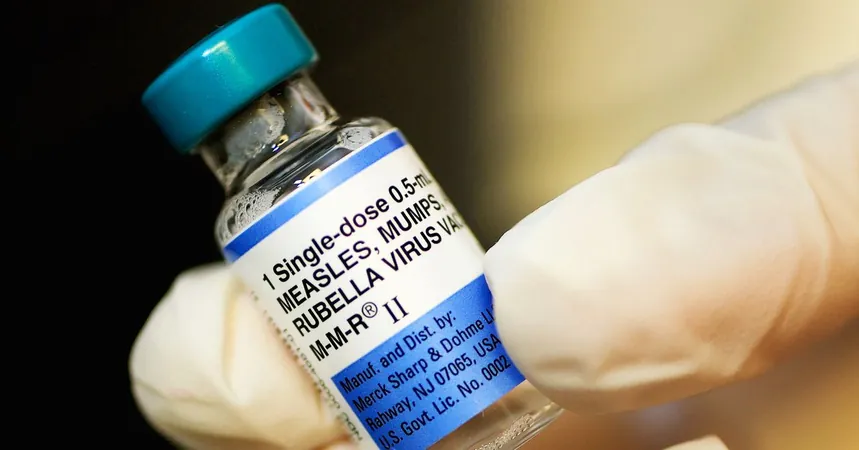
Controversial Vaccine Panel's Shocking Recommendations: A Delay in Protecting Our Kids?
2025-09-18
Author: Yu
Major Shift in Vaccine Guidelines?
In a surprising move, a federal vaccine advisory panel—handpicked by Health and Human Services Secretary Robert F. Kennedy Jr.—voted 8-3 to recommend delaying the MMRV vaccine (measles, mumps, rubella, and varicella) until children are at least 4 years old. This decision stems from concerns about a slight increase in the risk of febrile seizures in younger children.
The Dangers of Delaying Vaccines
While febrile seizures, which are typically harmless and short-lived, can be alarming for parents, experts warn that restricting the MMRV vaccine option may lead to lower immunization rates against serious childhood illnesses. Measles, mumps, and rubella pose significant health risks for children, making this decision highly controversial.
The Role of the ACIP
The Advisory Committee on Immunization Practices (ACIP) advises the CDC on vaccine policies. Typically, their recommendations shape state vaccination laws, insurance coverages, and pharmacy access. However, many in the medical community are questioning the rationale behind this recent vote, especially since it was based on long-acknowledged data.
A New Era in Vaccine Politics?
Kennedy's approach marks a drastic shift in the landscape of vaccine policy in the U.S. After replacing the entire ACIP membership with individuals known for their skepticism towards vaccines, many fear that public confidence in vaccination could wane even further.
Why Delay the MMRV Vaccine?
During Thursday's deliberation, committee members explored the rationale for delaying not just the MMRV vaccine, but also possibly pushing back the hepatitis B vaccine until after one month of age. The hepatitis B vaccine is crucial because of its link to chronic liver infections which can lead to severe health issues.
Voices of Dissent
Two ACIP members voiced strong opposition to the recommendations, questioning why these changes were even up for debate without new evidence. They feared that discouraging the combined MMRV vaccine would strip parents of their choice and potentially worsen already declining vaccination rates.
Experts Voice Concerns
Medical professionals are expressing confusion over the panel's recommendation. Pediatrician Melissa Stockwell highlighted the importance of maintaining vaccine options, stating that the minor risk of febrile seizures should not eliminate access to the combined vaccine. Similarly, Dr. Ari Brown emphasized that while febrile seizures can be concerning, they do not indicate a long-term health issue.
Impact on Insurance and Access
Despite voting against the MMRV vaccine for children under 4, the advisory committee affirmed its coverage under the Vaccines for Children program—providing free vaccines to vulnerable populations. However, the ramifications of this recommendation could still ripple through private insurance and access to the vaccine in pharmacies.
What's Next?
As discussions continue, all eyes will be on the CDC’s advisory panel, which will deliberate on whether to delay hepatitis B vaccinations. With vaccine policy under intense scrutiny, parents and health experts alike are eager to see how these decisions will shape the future of childhood vaccination.





 Brasil (PT)
Brasil (PT)
 Canada (EN)
Canada (EN)
 Chile (ES)
Chile (ES)
 Česko (CS)
Česko (CS)
 대한민국 (KO)
대한민국 (KO)
 España (ES)
España (ES)
 France (FR)
France (FR)
 Hong Kong (EN)
Hong Kong (EN)
 Italia (IT)
Italia (IT)
 日本 (JA)
日本 (JA)
 Magyarország (HU)
Magyarország (HU)
 Norge (NO)
Norge (NO)
 Polska (PL)
Polska (PL)
 Schweiz (DE)
Schweiz (DE)
 Singapore (EN)
Singapore (EN)
 Sverige (SV)
Sverige (SV)
 Suomi (FI)
Suomi (FI)
 Türkiye (TR)
Türkiye (TR)
 الإمارات العربية المتحدة (AR)
الإمارات العربية المتحدة (AR)